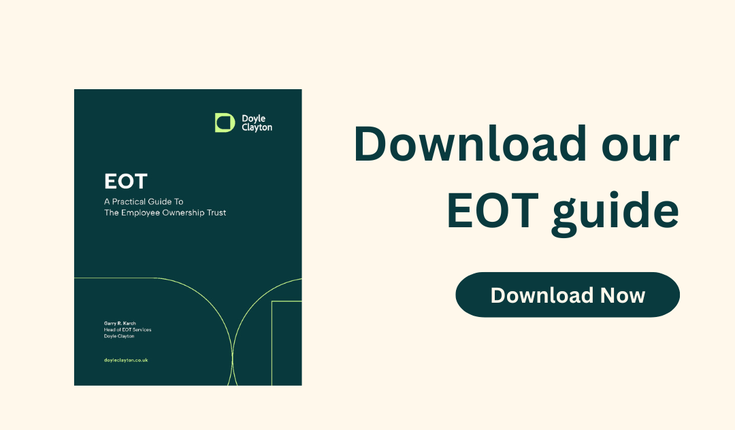Employee Ownership Trust (EOT) Services
Selling your business to an EOT in the UK
We work with vendors who are interested in selling their business to their employees using the Employee Ownership Trust (EOT) model. This approach results in the company shares being held in a trust on behalf of the employees.
We aim to ensure that you have a full understanding of the process and explain your options clearly. Our service includes a free and no-obligation feasibility analysis, using real-life examples, and we provide a detailed picture of what the transaction will look like and what's involved, leaving you in a position to make an informed decision about whether selling to an EOT is the right choice for you.
We can offer you support with the following:
- A professional valuation
- Structuring and raising third party capital
- Implementing tax-advantaged share schemes
- Obtaining HMRC clearance
- Drafting of documentation
- Building and developing an employee ownership culture.
What does selling your business to an EOT involve?
Introduced in the Finance Act 2014, by the UK Government, an EOT allows company owners to sell their business to their employees, without requiring any changes to the management structure, as the buyer is typically a trustee acting in the interest of all staff.
This business structure allows employees to collectively have a controlling interest in the business, but they do not take direct ownership of any shares, as they are beneficiaries of the trust. Incentive share schemes (EMI etc..) can be used alongside an EOT if some level of direct share ownership is desirable going forward.
You can view a typical EOT transaction structure here.
What are the criteria for setting up an EOT?
In order to sell your business to an EOT, the following criteria must be met:
- The company should be a trading company or part of a trading company;
- All employees must benefit from the scheme and be treated equally;
- The trust should own 50% of the capital of the business at all times.
What are the benefits of an EOT?
The EOT model provides many benefits to both the vendor and employees, some of which we have listed below. For detailed information, you can listen to our podcast, 'The pros and cons of selling your business to an EOT'.
Vendor benefits
- Company remains independent, leaving vendors to create an enduring legacy
- Time to complete is generally less when compared to third-party sales
- Transaction expenses tend to be much lower
- Sell at a fair market value with greater certainty of completion
- No third-party buyers and no need to share information with competitors
- Can benefit recruitment and staff retention
- Sale of a controlling interest in a company to an EOT is exempt from CGT (Capital Gains Tax)
- Sale proceeds do not deplete the Business Asset Disposal Relief (formally known as Entrepreneurs' Relief allowance)
- Excess cash may be distributed to the vendors tax-free as part of the equity value.
Employee benefits
- May qualify for tax-advantaged share schemes such as EMI options (individuals) or Share Incentive Plans
- Qualify for income tax-free bonuses up to £3,600 annually (National Insurance contributions apply)
- Qualifying employees will share in the proceeds of any future company sale
- Can provide long-term stable ownership which can preserve jobs
- Employees can have 'a voice' in how the business is run, giving them a sense of fulfilment and achievement.
For further information on EOTs, read our FAQs document here.
Why choose Doyle Clayton?
If you are reading this you are most likely considering an EOT structure for your business. Our experienced and friendly team are ready to help you to transition to a more inclusive way of running your business. Some of the reasons why you should choose us to help you are:
- Source of expertise - The first step on your journey has to be information gathering and consulting with experts. Understanding this, we have included a bank of information all FREE of course, to help you reach the right decision. Watch our informative webinars and read our Practical Guide to becoming Employee Owned. We are happy to have a no obligation chat with you and we will even go further and offer a FREE feasibility study so that you can be sure that you are making the right decision.
- We are EOT owned - We believe in the model so much that we converted to it ourselves in 2019! What's more, we managed the EOT restructure ourselves making us experts in this area. We have been advising companies (with great success) ever since, sharing our unique, first-hand experience with business owners. Your business is safe in our hands!
- Experienced team - Garry Karch is the head of our EOT team. He is one of the UK's leading advisers on Employee Ownership Trusts, his 30-year career has seen him complete over 150 transactions in the UK and the US with a combined value of more than £750m. Akshay Vaghela is our senior EOT adviser, and he brings numerous years of EOT experience and intricate knowledge to the team. Other experts on the team include company law experts, employment experts and pensions experts experienced in dealing with helping businesses become Employee Owned.
First hand experience of selling to an EOT
In 2019, we became an EOT owned business, managing the EOT restructure ourselves. This first-hand experience enhances the expert advice we provide our clients and allows us to provide them with deeper insight into the process.
Our Head of EOT Services, Garry Karch spoke to our Chair, Peter Doyle, about the journey the company made to become employee owned and why it chose to adopt this model.
Contents - find a topic
1. Minutes 0 - 1. Introduction
2. Minutes 1 - 4. Doyle Clayton's background
3. Minutes 4 - 6. Conversion to Employee Ownership Trust
4. Minutes 6 - 7. Converting to a limited company
5. Minutes 7 - 9. Ownership structure
6. Minutes 9 - 13. Next generation of shareholders
7. Minutes 13 - 15. Share ownership alongside the Employee Ownership Trust
8. Minutes 15 - 17. Other transaction options
9. Minutes 17 - 18. Valuation and value
10. Minutes 18 - 19. Fair market value
11. Minutes 19 - 20. Succession
12. Minutes 20 - 21:36. Succession planning
13. Minutes 21:36 - 23:40. Law firm specifics
14. Minutes 23:40 - 27. Vendor financing and raising third party capital
15. Minutes 27 - 32:20. Income tax free bonuses
16. Minutes 32:20 - 35:20. Management going forward
17. Minutes 35:20 - 37:30. Two years on (after becoming Employee Owned)
18. Minutes 37:30 - 38:40. Downsides of Employee Ownership Trusts
19. Minutes 38:40 - 40:40. Advice for taking a business into employee ownership
20. Minutes 40:40 - 41:29. Conclusion
Success stories: Some EOT case studies
Our Head of EOT Services, Garry Karch, is one of the UK's leading advisers on EOTs, having completed over 150 transactions in the UK and the US, with a combined value of more than £750m.
An East Anglian restaurant
We advised on the sale of a restaurant chain in East Anglia, to an EOT. This included structuring the transaction and conducting a full process to raise capital to support the transaction.
A metal fabrication buisiness
We advised a metal fabrication business in the northeast of England, with respect to the sale of the business to an EOT; the transaction included the valuation of the business. Additionally, this sale included the structuring of vendor loans on the same terms and conditions that third-party leaders would provide.
An electrical and mechanical contractor
Working with the vendors of an Essex-based electrical and mechanical contractor on the sale of the business to an EOT. This also included the business valuation and overall transaction structuring.
Contact Us
For further information on EOTs, and how we can support your business with selling to an EOT, click here to book a meeting with one of our specialists or, alternatively, contact a member of our team directly.
Garry Karch
One of the UK's best known Employee Ownership Trust advisers, Garry heads the firm's EOT Services team.
- Head of EOT Services
- T: +44 (0)20 3750 2492
- Email me
Akshay Vaghela
Akshay is EOT Services Director based at Doyle Clayton’s City Office.
- EOT Services Director
- T: +44 (0)207 123 8307
- Email me
Liz Barton
Liz is a highly experienced lawyer advising companies and individuals on all aspects of corporate law, from advising on company constitutions and corporate governance matters, to group reorganisations and share and business disposals and acquisitions.
- Partner & Head of Corporate
- T: +44 (0)20 7778 7238
- Email me




